Being in the company of friends is not only a cure for loneliness, but also a good way to relieve stress. New research observed overall lower levels of stress hormones in wild chimpanzees when surrounded by their peers. Interestingly, this isn’t just true for stressful situations—such as a confrontation from a rival chimp gang—but also […]
New research ranks causes for child stunting in developing countries 
As of 2011, nearly 40 percent of toddlers in 137 developing countries were stunted – a term used to describe children who are two or more standard deviations shorter than the global median. New research funded by the Canadian government offers a ranking of five main causes for stunted growth, with the leading causes described […]
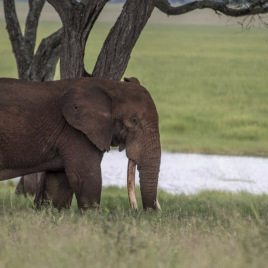
Elephant poaching can hurt tourism, new study finds 
In just seven years, from 2007 to 2014, the elephant population in Africa has been reduced by 30 percent – in large part as a result of poaching for ivory. This decline, aside from its disastrous consequences for the species, can also bring about major economic losses. A new modelling study has estimated a loss […]

MIT scientists create spinach that can detect explosives
Forget bomb sniffing dogs: the next big thing in explosives detection may be in your salad. A group of MIT researchers has created a type of spinach plant that can sense certain chemical compounds and even send an alert to a handheld device similar to a smartphone. Spinach plants can acquire this superpower through a […]
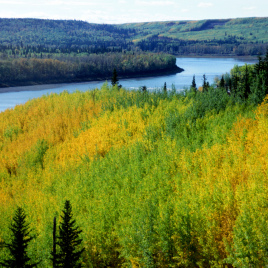
Keeping track of forests with satellite images 
We can tell when deciduous trees’ photosynthesis cycles change, whether we’re aware of the phenomenon or not—we witness this every autumn, as the leaves change colour and fall off. But in evergreen trees, the colour change is much subtler and therefore harder to track. An international team of researchers found that sensor data from satellites […]
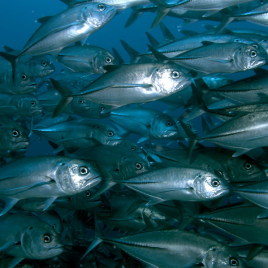
Want to escape predators? Become a synchronized swimmer 
For fish, blending with the group can be a matter of life or death. Just like humans prefer either the right or the left hand as their dominant limb, fish choose either the right or the left as their dominant swimming direction. But unlike human dexterity, in this bias to turning either right or left […]

Young stars shine a light into stellar evolution
Half of all stars that are similar to the Sun in the center of our solar system have at least one companion. There are two leading theories explaining why stars form in multiples, and a recent study provides further physical evidence to support one of those theories. The evidence comes in the form of high-resolution […]
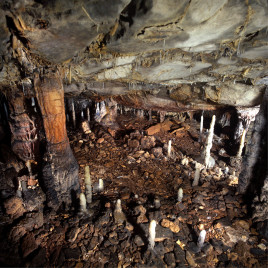
Human hunting contributed to cave lions’ extinction
One of the largest species of lions that ever lived, the Eurasian cave lion, became extinct around 14,000 years ago. For the first time, a new study finds a possible explanation for the decline of cave lions: hunting by Paleolithic humans. Cueto and colleagues examined nine fossilized cave lion toe bones from the Upper […]
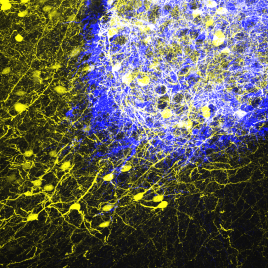
Brain damage may be repaired by “replacement” cell transplants
Damage to the brain is one of the most difficult injuries to repair — in large part, because of the highly specialized functions of cortical cells. But a team of scientists from LMU Munich recently found that the damaged neural connections can be rebuilt by transplanting embryonic neurons into the affected areas of the brain. […]
New research on the arrival of HIV/AIDS to the United States 
Much research has been done to determine the source of North American HIV/AIDS epidemic of the 1970s and 1980s. One of the most widely known studies supposedly identifies a single individual, ‘Patient Zero’, as the first known HIV-1 carrier in the United States. But recent research found that Patient Zero is unlikely to have been […]
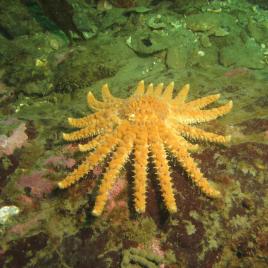
Sunflower sea stars are disappearing from the Salish Sea
Sea star wasting disease has caused the disappearance of numerous sunflower sea stars from the Salish Sea off the coast of British Columbia and Washington state. The disease, which broke out in 2013, has caused population declines in several species of starfish. A new study out of University of California Davis warns of the severe […]
Stuck in small spaces: Confinement helps stem cell organization 
You know that unpleasant feeling of the rush-hour commute, when you barely have any breathing room? Turns out that for stem cells, such tight spaces are a catalyst for sophisticated organization. As a team of researchers in Ottawa found, being packed like sardines helps stem cells organize into structures crucial for early mammalian life. Authors […]

Introducing guppies for mosquito control risks harming biodiversity 
Guppy fish were introduced in several cities as a way to combat carrier mosquito populations from spreading the dengue fever and the Zika virus. But new research out of University of Victoria recommends against this practice. Authors outline four arguments to support their reasoning. They say there’s limited evidence supporting the effectiveness of guppies as […]

Plants get the blues to survive
Vivid blue colours of plants like the various species of Begonia aren’t just for show, they are also a sophisticated survival mechanism. New research out of University of Bristol shows that the plants’ blue colour indicates the presence of specialized chloroplasts in the surface layers. Blue plants are designed to process sunlight five to 10 […]
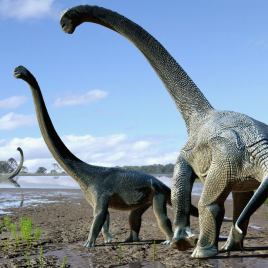
100-million-year-old fossils shed light on the arrival of titanosaurs in Australia
Two specimens from the Late Cretaceous period, described in a paper published in Scientific Reports, can shed light on how large herbivorous dinosaurs with long necks and tails arrived in Australia. Stephen Poropat and colleagues describe two species of Australian sauropod, remains of which were found in the Winton Formation of Queensland, northeast Australia. The […]

Enigmatic X-ray flares seen outside the Milky Way 
Two new sources of X-ray flares have been observed in galaxies near the Milky Way. While the nature of the X-ray bursts is uncertain, they are unlike any known object in the Milky Way and, as researchers note, seem to be located in old populations of stars. Another distinguishing factor for these mysterious flares is […]
